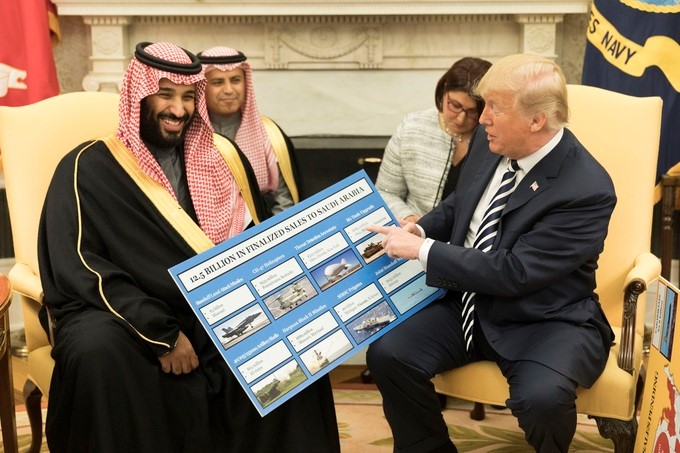
The Trump Administration has had an unfortunate numbing effect on the country’s political and ethical consciousness. Every day there is a new headline about a new scandal, any one of which would have dominated the news cycle in a previous administration. This has undoubtedly contributed to the President’s poor approval ratings, but it does mean that individual scandals can fall through the cracks in spite of their importance.
This pattern repeated in February, when the House Oversight Committee released a 24-page report citing multiple whistleblowers within the administration who alleged that key administration officials worked behind the scenes to push a private corporation’s proposal to build nuclear reactors in Saudi Arabia.
The story is rather tangled, but it involves some of the most prominent – and infamous – characters in the sordid drama of the Trump Administration. And the report, issued by the Democratic majority on the Oversight Committee, sheds further light on the administration’s scandal-prone nature.
What the Report Says
Paul Waldman summarized the report in The Washington Post. It’s an utterly fascinating illustration of how large, wealthy companies exercise power and influence in Donald Trump’s Washington DC.
A company called IP3 International – a self-described “private company that has assembled a consortium of US companies” – was looking to build nuclear reactors in Saudi Arabia. It’s important to understand that this is not a simple matter of signing some contracts with foreign companies and working out dollar figures – the Atomic Energy Act strictly regulates the export of nuclear technology in order to prevent the proliferation of tech and equipment that can be used to create nuclear weapons.
IP3 enlisted some heavy hitters to try to make that happen. Foremost among them was Michael Flynn, a former highly respected military officer who became a key advisor to then-candidate Donald Trump during the 2016 campaign. Flynn filed paperwork describing himself as an advisor to an IP3 affiliate during that time. Flynn would later be named National Security Advisor in the new Trump Administration, a position he held only briefly before he was forced to resign in disgrace as a result of lies he told as part of the investigation into the campaign’s ties with Russia.
Another important figure in the controversy was Derek Harvey, who served as senior director for Middle East and North African affairs at the National Security Council. The Oversight Committee’s report describes Harvey as a strong proponent of IP3’s Saudi Arabian plans, attempting to push it through over the objections of career staffers at the NSC and White House.
According to the committee’s report, Harvey’s actions so bothered NSC staffers that they repeatedly reported them to the council’s attorneys. The NSC’s legal adviser told staffers not to work on the project, since it was circumventing the necessary legal process.
Perhaps most intriguingly, in January 2018 a subsidiary of Brookfield Asset Management purchased Westinghouse Electric, a bankrupt nuclear services firm that is part of IP3’s consortium. Later that year, Brookfield purchased a 99-year lease on a building at 666 Fifth Avenue in New York City – a building owned by the family of Jared Kushner, the president’s son-in-law and a key White House official with a diverse portfolio of policy responsibilities. 666 Fifth Avenue had long been an albatross for the Kushner family, and Brookfield’s lease – paid up-front – was a life raft for the embattled Kushner real estate empire.
Jared Kushner has formed a “friendship” with Saudi Crown Prince Mohammed bin Salman, who has moved to consolidate his power in the kingdom through a series of brutal crackdowns and whose role in the murder of journalist Jamal Khashoggi remains an open question.
What It All Means
IP3’s proposal is still being discussed in the White House – the President himself participated in a meeting dedicated to it on February 12. Saudi Arabia’s Ministry of Energy, Industry and Natural Resources has contracted with two US firms to lobby on behalf of the proposal.
However, the Oversight Committee’s report is already beginning to bear fruit. Shortly after the report was issued, a bi-partisan group of legislators in both the House and Senate – including Florida Republican Marco Rubio – introduced legislation requiring Congressional approval for the sale of any nuclear power technology to Saudi Arabia. The legislation’s prospects in Congress are not clear.
While the story says a lot about the culture of corruption in the Trump Administration, it also illustrates the importance of Congressional oversight. It was easy to be pessimistic about the importance of the 2018 midterms, since Republicans maintained control of the White House and the Senate, but it was always crucial for Democrats to win control of some oversight mechanisms in Congress. It seems unlikely (at best) that this story would have come out if Republicans were still in control of the House Oversight Committee.



Enjoyed this story and your analysis, Andrew